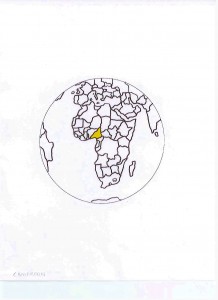A. THE COUNTRY
The Republic of Cameroon is a unitary republic of central and western
Africa. Elections are suspect with international and opposition groups
claiming government suppression of opposition. Cameroon is a member of
the British Commonwealth and La Francophone is closely allied to France.
There are simmering tensions between Anglophone and Francophone regions.
The economy is largely based on agriculture and oil exports, with the
majority employed in agriculture. Unemployment is high despite a
top-heavy civil service employing many. Cameroon has great geological
and cultural diversity. It has one of Africa’s highest literacy rates,
and one of the world’s highest corruption rates.
B. THE PEOPLE
The population is ~19,959,000 and the official languages are French and
English. There are about 286 peoples, with many more sub-groups and
dialects. Only the larger are mentioned here.
~26.5% are Grassfields Bantu, ~24.7% Northwest Bantu, ~9.7% Chadic,
~9.4% Fulani, ~8.7% Other Benue-Congo, ~5.5% Adamawa-Ubangi, ~13.3%
Other African, ~2.2% Others (Arab, Western, Asian).
C. RELIGIONS AND CHRISTIANITY/PENTECOSTALISM
Cameroon is a secular state that guarantees religious freedom.
Interfaith tensions have increased over recent decades, especially with
the increased profile of more radical Islamism.
~53.8% claim to be Christian, ~26% Muslim, ~18.99% Ethnoreligionist,
~0.9% Non-religious, ~0.25% Baha’i, ~0.06% Other.
In the Christian category:
~23.42% are Catholic, ~19.1% Protestant, ~4.18% Independent, ~6.7%
Unaffiliated, ~0.01% Orthodox.
Evangelicals represent ~9% of the population.
Charismatics represent ~6.5% and of those ~3.9% are Pentecostals.
Evangelicals, especially Pentecostals, have grown rapidly in the last
twenty years.
Of note, Jehovah’s Witnesses have ~67,000 affiliates.
Donna Siemens
References:
http://en.wikipedia.org
Operation World, Jason Mandryk. Colorado Springs: Biblica Publishing, 2010.

